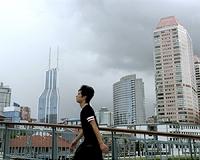| . |  |
. |
Seoul (AFP) Nov 11, 2010 The world's 20 biggest rich and emerging powers were locked late Thursday in anguished talks on fixing distortions that threaten global growth, as their leaders kicked off a fractious summit. The United States, striving to recover from its worst economic crisis in decades, locked horns anew with exporting giants China and Germany over a plan to rebalance skewed trade between deficit and surplus countries. President Barack Obama, grafting to salvage a deal at the G20 after suffering an economy-linked drubbing in US elections last week, said his administration wanted to boost growth via "prudent" economic policies. "It is difficult to do that if we start seeing the huge imbalances redevelop that helped to contribute to the crisis that we just went through," he told a news conference with the summit's host, South Korean President Lee Myung-Bak. "I don't think this is a controversial proposition." But controversy is rife in the G20 after the Federal Reserve instituted a 600-billion-dollar attempt to reflate the US economy, in a radical monetary step that foreign critics say will trigger tit-for-tat currency devaluations. Chinese officials sought to throw the onus back on the United States by arguing that Beijing has an "unswerving" commitment to reform its currency regime, but needs stability in the world economy to do it. "If you're sick yourself, don't ask others to take medicine," commerce ministry spokesman Yu Jianhua said, demanding the debt-ridden United States fix its own house first. In one-on-one talks with Obama, Chinese President Hu Jintao said: "I believe that with the concerted efforts of all the parties, the summit in Seoul will produce positive outcomes." British Prime Minister David Cameron, however, conceded that the G20 was not in a "heroic phase" after its determined response to the 2008 financial crisis, and that it needed to do "a lot more work" on fixing economic imbalances. Harried negotiators have been meeting long into the night all week in Seoul to try to pin down language that the G20 leaders can adopt in a closing communique on Friday. The talks were likely to drag long into Thursday night, South Korean officials said, after the G20 heads of government opened their two-day summit with a working dinner of Korean beef and halibut. "China is being very difficult in finalising the texts, so there might be brackets left for the leaders to fill in after all," a German government source said late Thursday. At best, South Korean and German officials said, the G20 may settle for a watered-down deal to task the International Monetary Fund with crafting guidelines to trim the yawning imbalances between creditor and debtor nations. Ahead of her own bilateral meeting with Obama, German Chancellor Angela Merkel lashed out at a more detailed US plan to rectify lopsided commerce by limiting the current account surpluses of big exporters. The United States wants the G20 to agree to curtail "excessive imbalances" as a back-door way of forcing China to realign its currency, which critics say is kept deliberately cheap to support Chinese exporters. But the proposal has run into trouble not just from China but from an array of nations including Germany, an export champion that insists its own trading prowess has nothing to do with any currency chicanery. "To set political limits on trade surpluses and deficits is neither economically justified nor politically appropriate," Merkel told a G20 business summit. In Beijing, the National Bureau of Statistics announced that China's consumer inflation was now running at its fastest pace in more than two years -- and an NBS spokesman said that would only worsen under the Fed's stimulus. Emerging economies around the world are worried that the billions in new Fed money will stoke speculative flows of foot-loose "hot money", and some are resorting to capital controls in a bid to stem the tide. There is anxiety that G20 nations could be heading for a return to 1930s-style trade protectionism, with damning consequences for the world economy two years after the start of the global financial crisis. Japanese Prime Minister Naoto Kan said the risk was of "competitive devaluation of currencies reminiscent of the Great Depression".
Share This Article With Planet Earth
Related Links The Economy
 Moody's boosts China ratings on 'resilient' economy
Moody's boosts China ratings on 'resilient' economyBeijing (AFP) Nov 11, 2010 Moody's on Thursday upgraded China's government bond ratings to "Aa3" from "A1" based on the country's "resilient" economic performance and prospects for continued strong growth. The international ratings agency said it was maintaining a positive outlook amid expectations that the world's second-largest economy would remain stable over the medium term. "The record of the past year demons ... read more |
|
| The content herein, unless otherwise known to be public domain, are Copyright 1995-2010 - SpaceDaily. AFP and UPI Wire Stories are copyright Agence France-Presse and United Press International. ESA Portal Reports are copyright European Space Agency. All NASA sourced material is public domain. Additional copyrights may apply in whole or part to other bona fide parties. Advertising does not imply endorsement,agreement or approval of any opinions, statements or information provided by SpaceDaily on any Web page published or hosted by SpaceDaily. Privacy Statement |